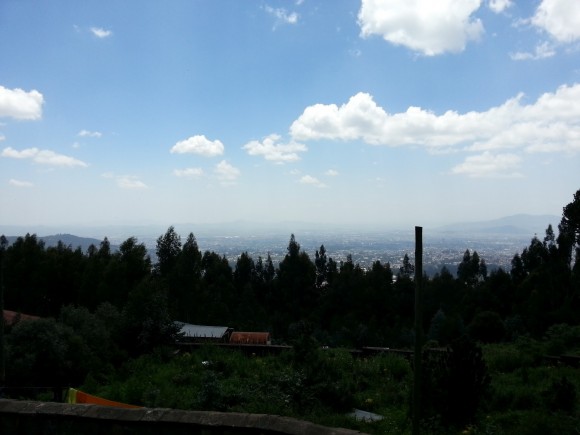
I’m Excited About The Future!

Sitting here in my hotel room after six great days with the ICSAddis COETAIL cohort that we kicked off this week and I can’t stop thinking about what an exciting time to be in Ethiopia. In fact what an exciting time to be alive!
I have a lot running through my brain right now so this might be a bit disjointed…but it’s my reflection and thoughts….so deal with it. 🙂
Our Connected World
We continue to talk about and try to understand just how connected our world is becoming and just how fast this change is happening around the world. Ethiopia is no different. This is a country prime for change, prime for the connection, and they are moving there quickly. Most people outside of Africa don’t give much thought to the development that is happening here. We hear about Asia, about the Middle East, but Africa and the changes that are affecting this continent are not mentioned much in the Western world. But make no mistake of it, Africa is primed and coming on fast.
Let’s just look at the hard facts about Ethiopia.
The GDP of Ethiopia has been in a double digit climb year over year since 2004. Even during the recession Ethiopia saw 8% and 7.5% growth of their GDP.
In a recent news article while here Ethio Telecom (State ran Telecom company) released its latest numbers.
- Ethio Telecom’s customer base has reached 18.28 million people, registering a 59pct increase in the last fiscal year.
- Mobile services, which constituted the vast majority of the customer base, had anticipated reaching 21.9 million subscribers and in actuality attracted 17.28 million customers. This was an increase of 700,000 people, a 79pct achievement of the target. Fixed line numbers reached 805,000 people or 81.4pct of intended performance targets.
- Internet and data service customers reached 221,000, 89pct performance. This does not include 2.44 million users who receive mobile Internet service.
- There were more than 4,000 SIM and Voucher card retail distributors by the end of the fiscal year, while the number of wholesalers increased from six to 45, as the number of points of sale in the country reached over 45,000.
- “The number of mobile phone subscribers we have currently ranks us in the sixth position in Africa and first in east Africa,†said Abdurahmin adding that prominent countries like Nigeria, South Africa and Egypt are the ones beating Ethiopia’s figures.
Now….those numbers are fantastic for a country who is growing quickly and also shows just how fast the middle class is appearing here in Ethiopia. But…this isn’t what blew me away about this article. No it was this quote (bold by me):
“As we all know in this age of Information Communication Technology service is not a luxury, but it’s a basic necessity and development accelerator of every nation,†Jean-Michel said adding that Ethio Telecom accomplished encouraging results and should meet the sector target of the five year GTP plan.
Does every nation know this? There are some countries that believe the connection, the Internet, is a basic necessity. But there are others….to name one….America…..that from what I’ve seen haven’t made this type of commitment.
Stop and think for a minute about what that statement means to a developing country like Ethiopia and where this could lead them into the future. How exciting of a time for Ethiopia.
Being here and experiencing Addis Ababa has been amazing. The construction that is going on everywhere is insane and totally reminds me of Shanghai when we arrived in 2005. The country is growing so fast, the middle class is growing so quickly, that trying to build the infrastructure to handle it all becomes frustrating. But make no mistake…it’s being built.
There is no such thing as too fast a connection

Maybe it’s just me but I’ve never heard anyone complain of their Internet connection being too fast. Internet speed is something we all complain about. No matter if you have 1mb or 100mb we’ll find a way to complain about it. At ICSAddis I was reminded about it this week. The school has continued year over year to increase their bandwidth based on what the countries infrastructure allows. This year they are up to 20mbps which isn’t a bad speed for a school of about 800 students. However, because Ethiopia is growing so quickly it’s not a stable connection. The line gets cut, the speed drops at heavy use times during the day, and overall the connection isn’t reliable. But it continues to improve, it continues to get better, and we (OK…..me) have to remind ourselves just how amazing this whole things is. China went through this with their growth, and so did Thailand (and still is). It’s a natural part of wiring a country…it’s not an easy task, and when everyone wants the connection….craves the connection….you physically can’t built it fast enough.
Why the future might belong to Africa
Also in the paper while I was here (who knew reading a paper would be so informative 😉 ) was the release of the 2012 Edition of the African Economic Outlook.
With almost 200 million people between the ages of 15 and 24, Africa has the youngest population in the world. And it keeps growing rapidly. According to recent estimates, the number of young people in Africa will double by 2045. If this trend continues, the continent’s labor force will reach one billion by 2040, making it the largest in the world.
Now that’s something to think about! What does the world look like when the largest labor force is in Africa?
The report warns that high unemployment among youth poses a serious challenge for the economies of African countries, whose recovery from the 2011 global economic and financial crisis had been remarkable.
Emmanuel Nnadozie stated that challenges facing youth employment often vary across African countries and different income groups, he added, stressing the fact that in low-income countries, “youth in vulnerable employment and working poverty are the largest majorityâ€, while “discouraged or inactive youth†are the most common group in middle-income countries.
Africa’s youth population is not only growing rapidly, it is also getting better educated. Based on current trends, about 59pct of 20-24 year olds will have had secondary education in 2030, compared to 42pct today. With the number of youth in Africa set to double by 2045, creating productive jobs for young people will continue to pose an immense challenge, according to reports.
You can read the whole article yourself but these quotes really stuck out to me. So, I’m reading all of this, I’m here in Addis experiencing the construction, seeing the people go about their daily lives, watching the growth happen around me and all I can think is WOW!
What if?
What if the government can make the Internet a utility for all? What if this growing youth population has a fast, steady connection to the outside world? What if, free online education sites continue to grow? What if the youth in Africa start educating themselves? What if this youth generation connect, grow, and learn together? What if this is the future?
I know those are a lot of “What If” statements. But I consider myself to be a pretty well traveled person (37 countries and counting) and I have to say the future is exciting on a global level. I see what is happening in Thailand, in China, in countries that many people haven’t even heard of like Burma, Laos or Cambodia and I am excited for humanity. Sure it has been hard work to get here, and sure there is a lot of hard work in front of us. But it’s OK once in a while to step back and be proud of what we have accomplished…where this is all going and how the Internet….the connection……might just be the best thing to happen to humanity yet!







Great article Jeff, as I read through it, I kept thinking – looking at the numbers you were quoting and thinking that there’s a massive opportunity to connect with the younger generation through mobile education apps.
Very interesting to read your thoughts on your time here in Addis, Jeff. It is always fascinating to see those who visit this continent for the first time; typically, it is a very “eye opening” experience. Here is a recent article from the Guardian Weekly on how the west must change outdated views on Africa you might find interesting:
http://www.guardian.co.uk/commentisfree/2012/aug/26/ian-birrell-emergence-new-africa
During my time here I observed how many citizens completely bypassed landline telephones and went straight to cell phone technology. I expect something similar will happen with other technologies as well. Thanks for sharing.
I am very impressed that you put together what you learned “on the ground” and combined it with information that you found on the internet and of all things, a newspaper. As you recognized, Ethiopia and other 3rd world countries have skipped some of the traditional steps in modern technology. For example, no one requests a land-line phone anymore, they simply buy a mobile phone. Ethiopia will most likely progress along the same lines in banking and other industries by going straight to mobile apps and simply skipping the traditional web apps – more accessibility to the people! I’m pleased that you are excited about the future in Ethiopia and the world – you are so right, we live in an amazing time.
Mr. Utecht,
I cannot stress enough my love and passion for all things Africa. The first thing on my bucket list is to adopt brothers from Ethiopia. I hope to have the opportunity to go, or maybe even live there one day. Your post really struck home with me. It excites me to see that country progress. It’s not very often you get to read positive stories about Africa here in America. Your post was a breath of fresh air to me.
Hillary Hayes
@hillkhayes
A student at the University of South Alabama in Mobile, AL
Hi Jeff,
Africa is definitely a place that sinks its hooks into you. In Italian there is even a name for the strong and unshakable nostalgia that you feel when you leave Africa…mal d’Africa. I was born and grew up in Tanzania and recently returned there to live for four years. Now living in Oman I suffer from mal d’Africa.
Africa is a magical, bustling, inspiring, and beautiful place to live and raise a family. At the same time it is can be maddening, frustrating, and tiring. The promise that the future holds is huge. Yet sometimes the future seems so far away in Africa. I liked reading your ideas, so full of optimism, promise, and positive statistics! I think that ultimately much of what you say might be true. Most of Africa still has much work to do before it can compete with the rest of the developed world in terms of standard of living, but piece by piece I think that it will get there.
What I think is interesting is that many African countries are beginning to develop their infrastructures only now. They are starting tabula rasa, with virtually nothing currently in place. As they become connected, they will build infrastructure that is current, that is designed to support and enhance a connected society. In the West we have adapted pre-digital age infrastructures to work in this new age.
I wonder what Africa will look like in 50 or 100 years. exciting times indeed.
Mungu ibariki Afrika
Regards,
Marcello
Great article Jeff! The article is so optimistic for our future. It is great that many of us wants change. Keep inspiring Jeff.
Mr. Jeff,
I am Keiko Ito and a student in Dr. Strange’s EDM 310 at the University of South Alabama. I really enjoyed to read your post. I could learn what I had never known about Africa countries. I want to know the developmental process in that countries. Thank you for helping.
Keiko Ito
Mr. Utecht,
I am a secondary education major at the University of South Alabama. In the EDM310 class I am taking we are learning about using technology in the classroom and how important it is to be a technologically literate teacher. Thank you for sharing this information about Ethiopia and their technology advancements. The quote you referenced about technology not being a “luxury”, but a “basic necessity” is thought provoking. I agree that more countries should think this way.
[…] am excited about the future of Africa and what this means for the people there. I have talked about Africa before and can’t wait to go back to experience more of this amazing continent and its people. There […]